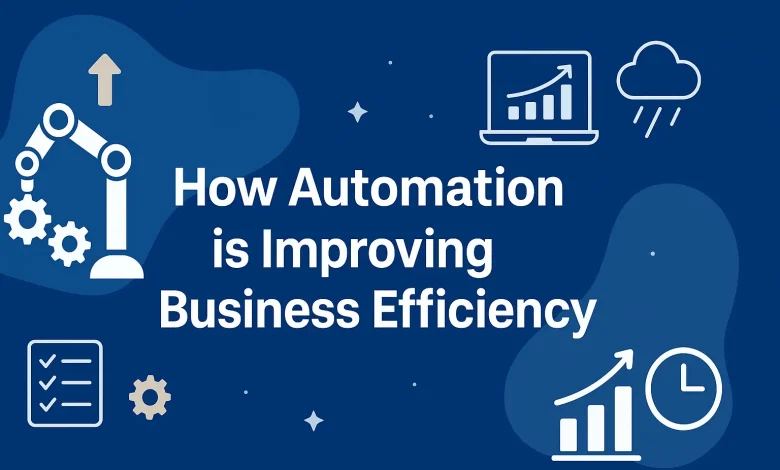How Automation is Improving Business Efficiency

Businesses today are transforming their operations through automation, simplifying workflows, and cutting expenses in every sector. Businesses that embrace automation are not only achieving higher productivity but also enhancing accuracy and customer satisfaction.
This article explores how automation is improving business efficiency, highlighting the benefits of automation in business, practical examples of automation in business, and future opportunities for growth.
The Role of Automation: How Automation Improves Efficiency
The adoption of automation tools allows businesses to optimize workflows and reduce repetitive tasks. From data entry to customer service, automated solutions save time and minimize errors. By shifting manual work to intelligent systems, employees can focus on higher-value tasks.
How automation improves efficiency is clear: it boosts productivity, ensures accuracy, and lowers operational costs. With advanced technologies like AI and machine learning, automation supports smarter decision-making and more effective operations.
Key Benefits of Automation in Business:
Time Savings: Automated tasks reduce delays and accelerate operations.
Error Reduction: Intelligent systems minimize human mistakes.
Summary: Automation drives smarter operations and clearly shows how automation improves efficiency across industries.Customer Service Automation: How Technology Improves Business Efficiency
Customer service is one of the most transformed areas due to automation. Chatbots, AI-driven support systems, and self-service platforms provide instant responses, ensuring customer needs are met 24/7.
These solutions enhance response speed while gathering insights to tailor future customer experiences. How technology improves business efficiency is evident here, as businesses can handle more customer requests without increasing staff, while maintaining high-quality support.
Customer Service Efficiency Through Automation:
Chatbots: Provide quick and accurate answers to customer queries.
Personalization: Data-driven automation tailors customer experiences.
24/7 Support: Clients receive help anytime, anywhere.
Summary: Automated customer service demonstrates the benefits of automation in business by enhancing satisfaction and loyalty.Optimizing Business Data: How Automation Improves Workplace Efficiency
Data is the backbone of modern business. Automation tools help companies collect, analyze, and interpret vast amounts of information quickly. This leads to faster decision-making and improved accuracy in predicting market trends.
One of the advantages of automation in the workplace is better data management—automation reduces human errors and turns raw information into actionable insights. This improves planning and supports long-term business strategies.
Automation in Data Handling:
Real-Time Analytics: Faster insights for immediate action.
Improved Accuracy: Automated tools reduce data errors.
Predictive Insights: AI forecasts future business outcomes.
Summary: Data automation highlights the benefits of automation in business and shows how it improves operational efficiency.Supply Chain Automation: Examples of Automation in Business
Automation is transforming supply chains by optimizing inventory management, order processing, and delivery systems. Smart software ensures that products are available when needed while reducing waste and costs.
Examples of automation in business include robotic warehouse systems, smart tracking tools, and automated order processing. These solutions improve efficiency, reduce costs, and enhance customer trust.
Key Supply Chain Improvements:
Inventory Management: Automation prevents shortages and overstocking.
Robotics in Warehouses: Faster and more accurate product handling.
Smart Tracking: Real-time visibility improves delivery efficiency.
Summary: Automated supply chains reflect how automation is improving business efficiency, ensuring businesses remain agile and competitive.Emerging Automation Trends: How Automation is Improving Business Efficiency
As technology continues to evolve, automation will expand into even more areas of business. Artificial intelligence, machine learning, and robotic process automation (RPA) will redefine how companies manage tasks.
The benefits of automation in business include faster innovation, reduced costs, and enhanced collaboration across industries. Companies adopting advanced automation early gain a significant competitive advantage in the global marketplace.
Future Trends in Business Automation:
AI Integration: Smarter decision-making with artificial intelligence.
Process Automation: Increased use of RPA across industries.
Collaborative Robots: Machines working alongside humans to boost efficiency.
Summary: The future confirms how automation is improving business efficiency, driving growth and unlocking new opportunities.Conclusion
Adopting automation is now vital for businesses, forming the foundation for sustained growth and efficient operations. From customer service to data management and supply chains, automation increases efficiency, reduces costs, and enhances customer satisfaction.
By understanding how automation improves efficiency and implementing the advantages of automation in the workplace, companies can achieve higher productivity and better results. Investing in automation today ensures a smarter, more efficient future for businesses of all sizes.




